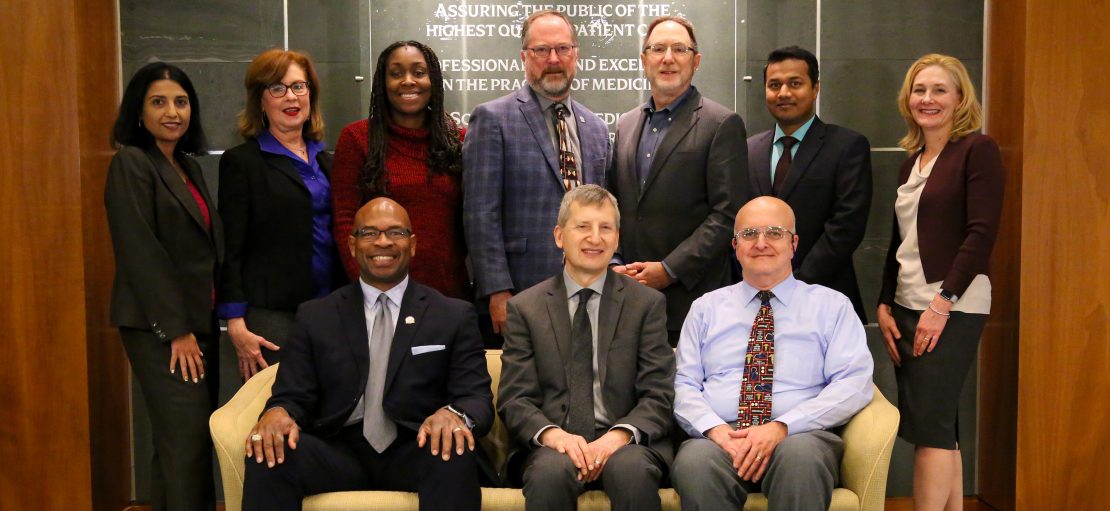Summary Report: Fall 2019 Internal Medicine Board Meeting
January 15, 2020 | Posted by ABIM | ABIM Governance, MOC, News, Physician Feedback
Meeting Highlights
During our December meeting, ABIM’s announcement concerning the development of a longitudinal assessment option for Maintenance of Certification (MOC) and how it would work for internists took center stage.
A number of other key issues for ABIM and the internal medicine community were discussed, and we received important updates from ABIM leadership and staff. The following report covers the highlights of our meeting.
New Members of the Specialty Board
We were pleased to welcome two new members to their first Internal Medicine Board meeting:
- Nagendra Gupta, MD is a full time practicing hospitalist with Apogee Physicians and currently runs the Hospitalist Program at Texas Health Arlington Memorial Hospital in Arlington, Texas.
- Jonathan J. Roberts, MD is CEO of Goodwood Primary Care Clinic, LLC based in Baton Rouge, LA.
Learn more about each of these members by visiting the Internal Medicine Board webpage.
About the Longitudinal Assessment Option
Richard J. Baron, MD, ABIM President and CEO, provided an update on the development of the longitudinal assessment option, and reactions of society partners and diplomates. He also described ongoing planning activities related to the new pathway and efforts to gain input from the many stakeholders in the physician community.
It is anticipated that the longitudinal assessment option will be available in 2022. Additional information on its features and transition plans will be provided as they become available. We welcome you to share your comments and suggestions here.
Following Dr. Baron’s update and presentations from other ABIM staff on the longitudinal assessment option, the Internal Medicine Board shared their thoughts on the new pathway, and how it relates to the internal medicine community.
- The group thought that the immediate feedback offered in the longitudinal assessment pathway was a great feature in that it supports learning in real-time.
- Members suggested transparent communications about performance over time and potential consequences of poor performance so that physicians have the opportunity to improve.
- They also advised ABIM to plan for smooth transitions to the new longitudinal assessment pathway for physicians who opted to take the Knowledge Check-In in Internal Medicine during its first administrations.
Board Eligibility
In 2012, ABIM defined the Board Eligibility period to be seven years after completing initial certification eligibility requirements, primarily graduation from an ACGME accredited residency and/or fellowship. 2019 is the final year of Board Eligibility for all physicians meeting initial certification eligibility requirements on or before 2012, and physicians who have not become initially certified in the last seven or more years will need to complete a year of training in an ACGME accredited residency in order to register for a future ABIM initial certification examination.
Members discussed data on the group of physicians whose seven-year Board eligibility period in Internal Medicine will end in 2019, and the group will work with staff to monitor Board Eligibility outcomes moving forward.
Exam Committee Update
As part of ABIM’s organization-wide effort to enhance the connection between Exam Committees and their corresponding Specialty Boards, Chair of the Internal Medicine Board Exam Committee, Guido V. DeJesus, MD, joined the meeting to discuss the effect of the transition to longitudinal assessment on the work of the Internal Medicine Board Exam Committee. He illustrated how the Exam Committee’s efforts are evolving to meet the demand for more questions for ABIM assessments while maintaining the same quality and rigor. This entails collaborating with ABIM Item-Writing Task Forces whose work contributes to developing content by utilizing an innovative, model-based approach. The Task Forces’ question development techniques involve establishing a set of specifications for creating exam questions for a given content area. These specifications are then used to produce many high-quality questions in a given subject area.
Diplomate Professional Profiles
The Diplomate Professional Profile is currently being updated to include specialty-specific questions. Once finalized, diplomates will be asked to complete a periodic survey about the characteristics of their professional activity so that ABIM can assure relevancy of our programs and assessments based on what physicians see in practice. Members provided feedback on the development of questions for the survey that are specific to internal medicine, and they reviewed the questions that all diplomates answer on the survey, regardless of specialty.
In Closing
The Internal Medicine Board invites feedback and commentary from diplomates, society partners and the greater medical community. We hope you find this report to be valuable and informative.
Do you have any questions? Are you interested in how to get involved?
If you have questions after reading this report, please connect with us through the following channels:
- Subscribe to blog.abim.org for regular updates
- Call:1-800-441-ABIM (2246)
- Email: request@abim.org
- Join our Governance to help guide our future direction
- Join our Community Insights Network to share your feedback.




